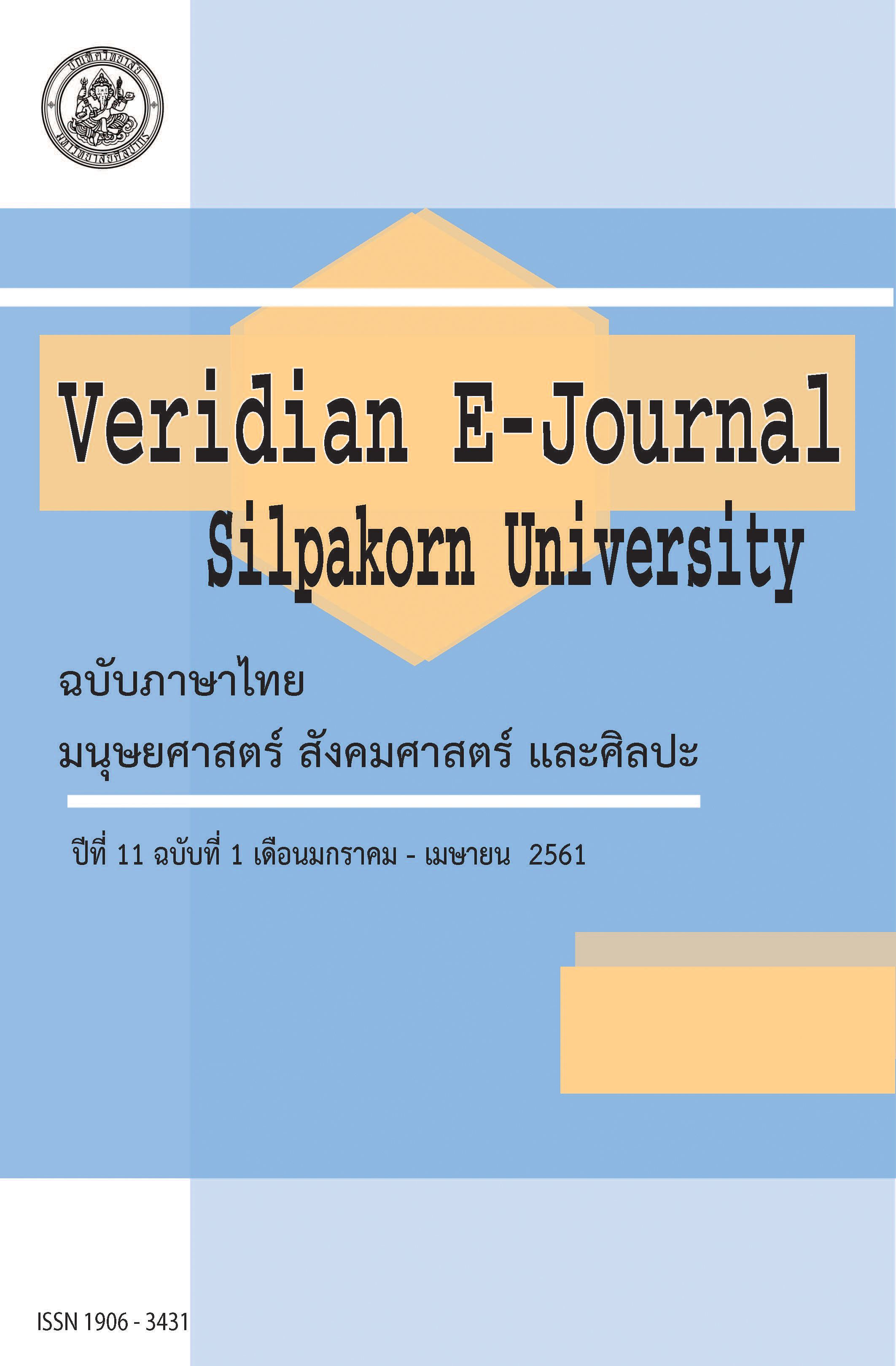อุปลักษณ์เชิงมโนทัศน์เกี่ยวกับบุคคลที่สามของความรักในเพลงไทย: การเปรียบเทียบมโนทัศน์ของผู้ที่มีสถานภาพต่างกันที่มีต่อบุคคลที่สาม (Conceptual metaphor ‘third person’ of love in Thai songs: a comparative study of perspectives of people who Conceptual metaphor ‘third person’ of love in Thai songs: a comparative study of perspectives of people who different status to third person
Main Article Content
Abstract
บทความนี้มีวัตถุประสงค์เพื่อเปรียบเทียบมโนทัศน์ของผู้ที่มีสถานภาพต่างกันที่มีต่อบุคคลที่สามจากถ้อยคำอุปลักษณ์และอุปลักษณ์เชิงมโนทัศน์เกี่ยวกับบุคคลที่สามของความรักในเพลงไทย โดยเก็บข้อมูลจากเพลงไทยลูกทุ่งและเพลงไทยสากล ซึ่งผู้วิจัยได้แบ่งการวิเคราะห์ออกเป็น 3 มโนทัศน์ ได้แก่ มโนทัศน์ของบุคคลที่หนึ่ง มโนทัศน์ของคนกลาง และมโนทัศน์ของบุคคลที่สาม ผลการศึกษาพบว่ามโนทัศน์ของผู้ที่อยู่ในสถานภาพต่างกันที่มีต่อบุคคลที่สามมีทั้งหมด 4 มโนทัศน์ ได้แก่ 1.บุคคลที่สามเป็นบุคคลที่กระทำความผิด 2.บุคคลที่สามเป็นบุคคลที่น่ากลัว 3.บุคคลที่สามเป็นบุคคลที่ไม่มีความสำคัญ และ 4.บุคคลที่สามเป็นบุคคลที่มีความสำคัญ เมื่อเปรียบเทียบมโนทัศน์ดังกล่าวของผู้ที่อยู่ในสถานภาพต่างกันจะพบว่ามีทั้งความเหมือนและแตกต่างกันไปในแต่ละสถานภาพ แบ่งได้เป็น 2 ประเภท ได้แก่ มโนทัศน์ที่เหมือนกันทั้ง 3 สถานภาพ คือ บุคคลที่สามเป็นบุคคลที่กระทำความ และมโนทัศน์ที่เหมือนกันเพียง 2 สถานภาพ ได้แก่ มโนทัศน์ที่บุคคลที่หนึ่งและคนกลางมีร่วมกัน คือ บุคคลที่สามเป็นบุคคลที่น่ากลัว มโนทัศน์ที่บุคคลที่หนึ่งและบุคคลที่สามมีร่วมกัน คือ บุคคลที่สามเป็นบุคคลที่ไม่มีความสำคัญ และมโนทัศน์ที่คนกลางและบุคคลที่สามมีร่วมกัน คือ บุคคลที่สามเป็นบุคคลที่มีความสำคัญ
This article aims to compare the perspectives of people who are different status to third person from the metaphorical expressions and conceptual metaphor about third person of love in Thai songs. The data elicited is from Thai pop songs and Thai folk songs; it is divided into 3 types – perspective of first person, perspective of intermediary, and perspective of third person. The study is found that the perspectives of people who are different status to third person have 4 perspectives – 1. Third person is a person who commits an offense. 2. Third person is a devilish person. 3. Third person is an unimportant person. 4. Third person is an important person. The comparative study of these perspectives has the similarities and the differences; it is found there are 2 categories. The first is the same perspectives, all 3 statuses – “Third person is a person who commits and offense.” And the second is the same perspectives, only 2 statuses – The perspective of first person and intermediary are “third person is a devilish person.” The perspective of first person and third person are “third person is an unimportant person.” and the perspective of intermediary and third person are “third person is an important person.”

